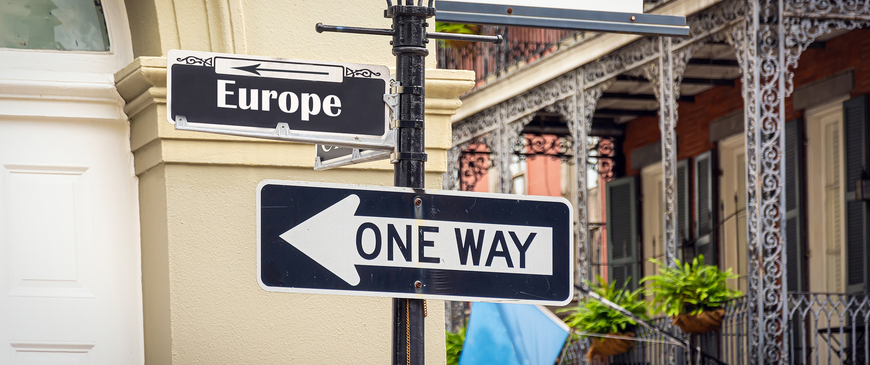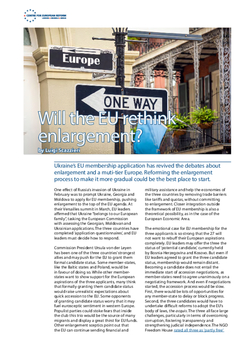
Will the EU rethink enlargement?
Ukraine’s EU membership application has revived the debates about enlargement and a multi-tier Europe. Reforming the enlargement process to make it more gradual could be the best place to start.
One effect of Russia’s invasion of Ukraine in February was to prompt Ukraine, Georgia and Moldova to apply for EU membership, pushing enlargement to the top of the EU agenda. At their Versailles summit in March, EU leaders affirmed that Ukraine “belongs to our European family”, tasking the European Commission with assessing the Georgian, Moldovan and Ukrainian applications. The three countries have completed ’application questionnaires’, and EU leaders must decide how to respond.
Commission President Ursula von der Leyen has been one of the three countries’ strongest allies and may push for the EU to grant them formal candidate status. Some member-states, like the Baltic states and Poland, would be in favour of doing so. While other member-states want to show support for the European aspirations of the three applicants, many think that formally granting them candidate status would raise unrealistic expectations about quick accession to the EU. Some opponents of granting candidate status worry that it may fuel eurosceptic sentiment in western Europe. Populist parties could stoke fears that inside the club this trio would be the source of many migrants and display a great thirst for EU funds. Other enlargement sceptics point out that the EU can continue sending financial and military assistance and help the economies of the three countries by removing trade barriers like tariffs and quotas, without committing to enlargement. Closer integration outside the framework of EU membership is also a theoretical possibility, as in the case of the European Economic Area.
The emotional case for EU membership for the three applicants is so strong that the 27 will not want to rebuff their European aspirations completely. EU leaders may offer the three the status of ’potential candidate’, currently held by Bosnia-Herzegovina and Kosovo. But even if EU leaders agreed to grant the three candidate status, membership would remain distant. Becoming a candidate does not entail the immediate start of accession negotiations, as member-states need to agree unanimously on a negotiating framework. And even if negotiations started, the accession process would be slow. First, there would be lots of opportunities for any member-state to delay or block progress. Second, the three candidates would have to undertake difficult reforms to adopt the EU’s body of laws, the acquis. The three all face large challenges, particularly in terms of overcoming corruption, fostering transparency and strengthening judicial independence. The NGO Freedom House rated all three as ‘partly free’ in 2021, with scores lower than Hungary, the poorest performing EU member.
Even if EU leaders agreed to grant the three candidate status, membership would remain distant.
A third set of challenges in accession negotiations relates to the EU’s own ’enlargement fatigue’. EU leaders have been scarred by rule of law issues in countries like Bulgaria, Poland and Hungary. They want to ensure that reforms in candidates are solidly entrenched, and ideally also that the Union has effective tools to deal with unruly members before enlarging further. New members will make the EU’s institutions even more unwieldy, and reforms, such as making more areas subject to majority voting or reducing the number of Commissioners, would probably be necessary. But some of these changes could only be made with the unanimous agreement of the European Council – which would be hard to secure – while others would need treaty changes, which many member-states oppose. Finally, many European countries will remain cautious of Georgia, Moldova and Ukraine joining the EU so long as they have unresolved disputes involving Russia, as all three do. According to the EU’s mutual assistance clause, other members would have to aid a member in case of an attack, raising the possibility of a conflict with Russia.
These challenges mean that even if accession talks with Georgia, Moldova and Ukraine started, they could result in disappointment and sap momentum for domestic reform – as has happened with the Western Balkans countries’ bids for membership.
Many European countries will remain cautious of Georgia, Moldova and Ukraine joining the EU so long as they have unresolved disputes involving Russia.
The difficulties inherent in enlargement have led some European leaders to propose alternatives. The most recent is French President Emmanuel Macron, who has called for a new ‘European political community’ .This would include the EU and its democratic neighbours, including Ukraine and the UK. Macron did not go into much detail, but said the community would be a way for non-EU countries to be associated with the Union, and to have closer political dialogue and economic co-operation with it in areas like energy, transport, free movement of people, and investment. Other politicians and thinkers have put forward ideas similar to Macron’s, ranging from European Council President Charles Michel’s ‘geopolitical community’, to former MEP Andrew Duff’s notion of ‘associate membership’. Crucially, none of these proposals are intended to shut off the three candidates’ route to EU membership. Instead, they are supposed to foster greater co-operation with the EU in parallel with the accession process. But any proposal of an alternative to membership will almost inevitably seem like a rebuff to applicants, who already have broad ’association agreements’ with the EU and would suspect that any such new institutions were a way of holding them at arm’s length.
One alternative would be reforming the accession process so that candidate countries can be integrated into different EU policy areas gradually, rather than only when they become full members. For example, as candidates adopted the acquis, they would receive more funds from the EU, be gradually integrated into parts of the single market, take part in foreign policy discussions and see their citizens freer to travel to the EU. Some of these ideas are already reflected in the Commission’s new accession methodology adopted in negotiations with Serbia and Montenegro. But the new methodology is not yet fully fleshed out: the EU needs to ensure that the benefits of a phased process are tangible. And the EU should offer candidates much closer political ties and some decision-shaping rights as they progress towards membership. For example, leaders from accession countries could be regularly invited to EU summits, while their officials could be seconded to EU institutions, hold dialogues with Council working parties, and participate in Commission expert groups.
Phased membership would not allow EU leaders to dodge the question of whether they wanted to admit new members or not. But a more gradual approach to enlargement could at least provide concrete short-term incentives for candidates to undertake the reforms required for EU membership. This would maximise momentum for reform in Georgia, Moldova and Ukraine, if they are declared candidates, and inject new energy into the Western Balkans’ aspirations for membership. Sceptics of enlargement could be won over more easily if they saw candidate countries reform and got used to working with them prior to accession. The EU would reap political benefits too, in the form of greater influence in the accession candidates, and a more prosperous and stable neighbourhood. Finally, a phased accession process would further blur the distinction between membership and non-membership. Over the medium term, this could help persuade the member-states that the Union could closely integrate with neighbours that do not seek membership or cannot be members, paving the way for notions like associate membership.
A more gradual approach to enlargement could at least provide concrete short-term incentives for candidates to undertake the reforms required for EU membership.
The EU’s relations with its neighbours have long been held back by the dysfunctional accession process and by the lack of appealing alternatives to membership. The war in Ukraine should finally spur the EU to reform the way it enlarges and embrace new models of integration. The Union and its neighbours would be stronger for it.
Luigi Scazzieri is a senior research fellow at the Centre for European Reform.

